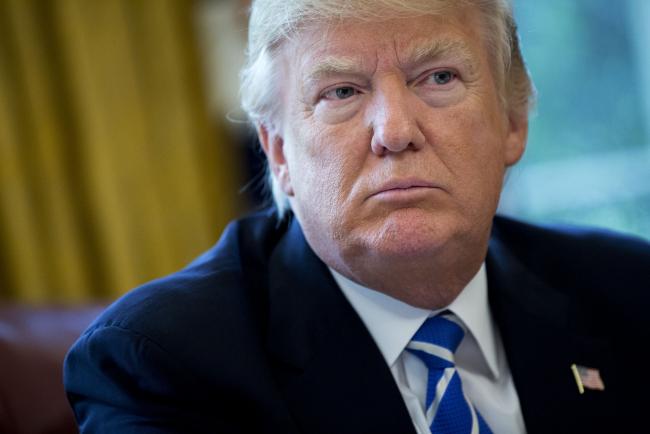(Bloomberg) -- The word is officially out: Good is bad in the stock market once again (and, by extension, bad is good).
When President Donald Trump finally weighed in Wednesday on the roller-coaster ride in equity markets, he went all the way back to the initial trigger from last week, lamenting how a strong U.S. jobs report sparked the first round of selling. “In the ‘old days,’ when good news was reported, the Stock Market would go up,” Trump said on Twitter. “Today, when good news is reported, the Stock Market goes down.”
All of which is sort of right. There are plenty of times in the past when good data was bad for the stock market -- anyone who was around for the Greenspan Fed years, remembers that -- but for the most part over the last decade, he’s right, good was indeed generally good. In fact, of the 10 biggest positive surprises in that span on an index that measures how data stacks up against expectations, the S&P 500 rose seven times.
So the reaction to the January jobs report -- a 2.1 percent plunge in the S&P 500 Index on Friday alone -- seemed to signal a break from that pattern. Why? Because unlike recent years, when the economic expansion was tepid and in its early stages, growth is running so hot now that investors fear that signs of even more strength will prompt the Federal Reserve to speed up the pace of interest-rate increases.
And not only could higher rates cool the economy back down, but they make it more expensive to buy stocks on credit. Both of which are potentially bad for the market. As a result, experts say, good-is-bad is likely to be the new pattern for a while.
“There’s an element of truth in that yes, good news is prompting markets to reassess the loose monetary policy that has been in place the last 10 years,” said Massud Ghaussy, director at Nasdaq Advisory Services. “As we’re seeing inflation pick up, as we see wage growth, as we see GDP growth kicking in, the Federal Reserve has no other choice but to essentially raise interest rates and normalize -- and that will in turn shock the equity markets.”
The turmoil that started Friday and contributed to biggest market rout in almost seven years on Monday is familiar to anyone who has lived through past episodes of Fed angst. It’s a sort of paranoia that any sign of inflation that will encourage policy makers to raise rates.
“It’s the most common thing that can halt a bull market,” said Donald Selkin, New York-based chief market strategist at Newbridge Securities Corp., which manages $2 billion. “The Fed sees economic activity picking up, and the demand for credit picks up, then they say ‘oh, we have to raise rates to cool things off a little bit.’
Chicago Fed President Charles Evans did just that Wednesday, sending the S&P 500 Index down from its session high after saying that if officials get “more confidence that inflation is moving up sustainably, then further rate increases would be warranted.”
The worry for equity investors is that higher interest rates bring higher Treasury yields, which could dampen the stock market’s upward climb in a variety of ways.
The 40-day correlation between the U.S. Citi Economic Surprise Index and the S&P 500 is at its lowest level since 2015. The gauge, which rises when economic data is better than expected, jumped nearly 10 percent Friday as equities tanked.
“Oftentimes, the employment numbers or other meaningful economic statistics don’t register very significantly in terms of market reaction and the market will tend to trade within the confines of directionally what it had been going into it,” said Jim Grabovac, an investment strategist at McDonnell Investment Management. “Coming into last year, the markets underestimated what the Fed would ultimately do with three tightenings. We think coming into this year with this reaction thus far, the market is probably overestimating.”
And as traders assess what better-than-expected economic data means for the Fed’s interest rate hike trajectory, they’re also trying to figure out how much President Trump’s tax overhaul will fuel growth.
Analysts at Strategas Research Partners estimated the tax cut will add 0.2 to 0.3 percent boost to GDP this year, which is currently growing at a yearly rate of 2.5 percent. Now “the realization is kicking in that economic growth will be higher,” the analysts led by Daniel Clifton, head of policy research, wrote in a note Monday.
The Atlanta Fed increased their GDP growth forecast last week to 5.4 percent, the highest reading since 2012. Clifton notes that this number could change throughout the quarter, but a growth number of this caliber isn’t too surprising when compared with historical reactions to fiscal policy.
“In 2003, when the tax rates on income were dropped, real GDP was 7 percent at a time of consensus 2 percent growth,” Clifton wrote. “Yields had to move higher to reprice this ‘unexpected’ growth.”
Still, some say good news can’t stay bad news forever. According to Keith Parker, head of equity strategy at UBS Group AG, the S&P 500’s pullbacks actually tend to be narrower when economic data beats forecasts.
“When economic data surprises have been positive, equity pullbacks have averaged 5 percent, suggesting last week’s 4 percent selloff is close to an end,” he wrote in a note to clients Monday.
